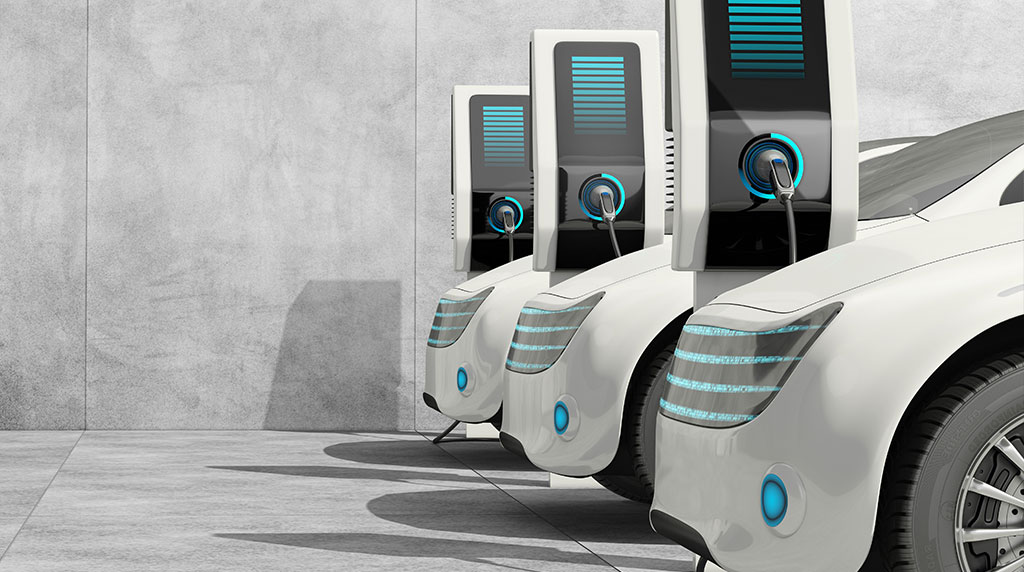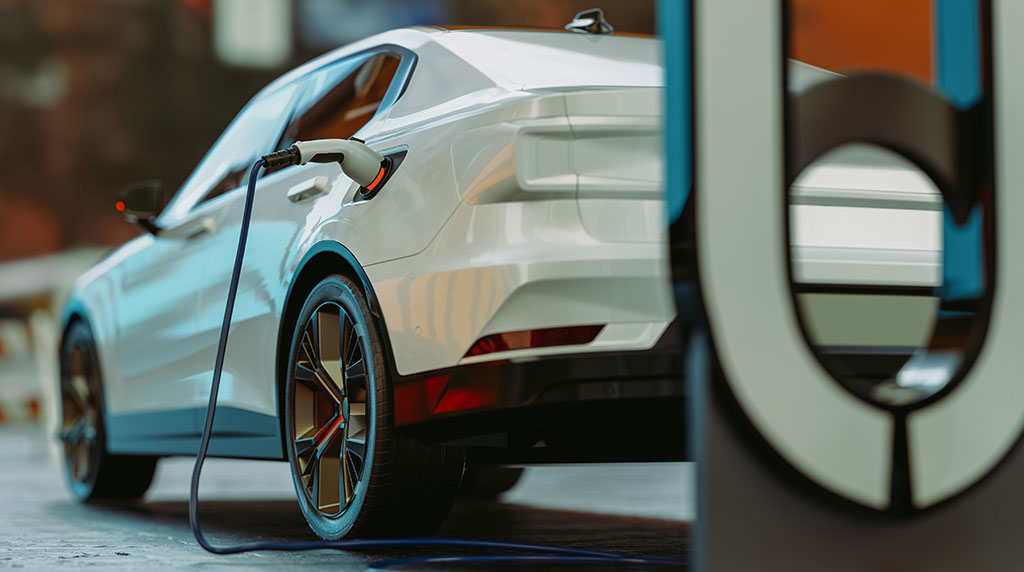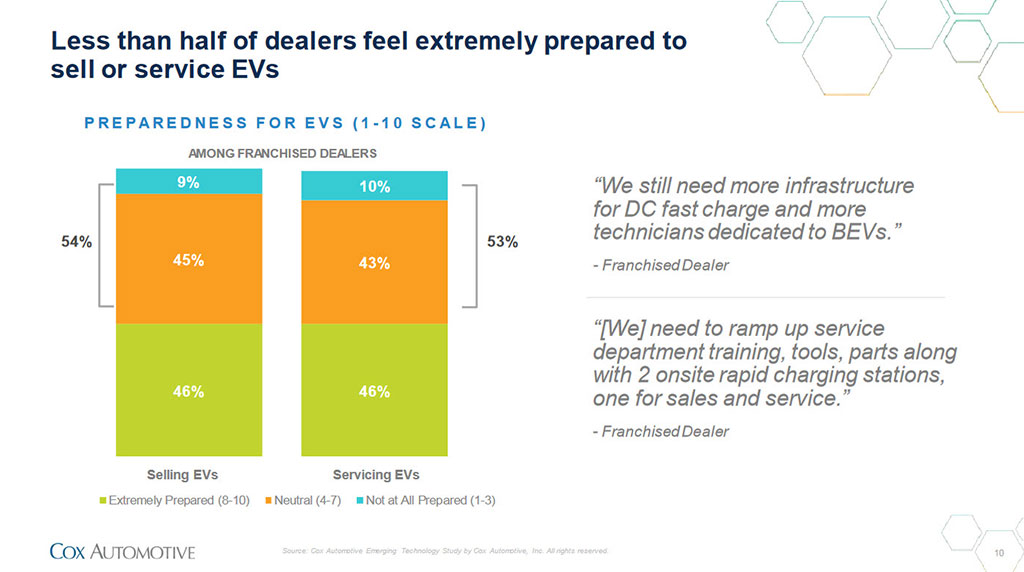The result is a growing inventory of unsold EVs in the US which has alarmed some car-makers and – particularly – dealers.
The Cox survey, The 2023 Path to EV Adoption: Consumer and Dealer Perspectives, also reveals a lack of EV readiness by US automotive dealers regarding sales and service and also sends a message of caution for automotive businesses outside of the US.
In Australia, Cox Automotive said that EV growth is following a similar template to what it is seeing elsewhere “so insights from US car buyers and dealers around areas of concern can give Australian dealers a head start to make sure they capitalise on what’s coming.” (See story: Supply, pricing drives Aussie EV sales – Cox)
Separately, Cox stated that the inventory of EVs in the US in June was at 103 days supply.
The US industry had 90,953 EVs in supply during the 30 days that ended June 26, with 26,420 sold at an average listing price of $US63,486 ($A93,000). The numbers exclude Tesla, which sells direct to consumers. Only ultra-luxury vehicles and high-end luxury cars had more inventory on hand.
GM, which said many of its EVs are in transit and are already sold, had some of the lowest number of EVs in stock. The Cadillac Lyriq closed June with a 50 day’s supply. The Bolt EV had only a couple thousand units available for a 23 days’ supply as it heads to being discontinued by the end of this year.
The Ford F-150 Lightning closed June with an 88 days’ supply, below the supply count for all F-Series pickups, which is above 100 days. The Mustang Mach-E had 116 days’ supply.
The BMW i4 was at the low end with only a 40 days’ supply.
The average listing price for EVs was $US63,486 ($A93,000) in June. However, the average transaction price, the price paid, was down 20 per cent compared with a year ago to $US53,438 ($A78,280) driven by Tesla price cuts and rising incentives.
EVs had the next highest incentives in June, after luxury vehicles in general. EV incentives were 7.1 per cent of ATP, compared with only 4.2 per cent for the total industry.
Cox Automotive points out that as EV inventories continue to climb, dealers must bridge this gap.
Cox Automotive Mobility’s manager of research and market intelligence, Kayla Reynolds, said education for dealers and consumers was critical in driving confidence and adoption of EVs.
“For dealers specifically, preparation is paramount, and our findings emphasise the urgency of equipping dealers with EV sales and servicing capabilities to meet the needs and demands of EV buyers,” Ms Reynolds said.
The Cox Automotive study surveyed 1024 consumers and 152 dealers in the US, comparing data points from EV research conducted by the company over the past several years.
It’s key findings are:
- Consumer consideration of EVs is growing rapidly but sales are moving more slowly.
- Cox Automotive is forecasting that one-million new EVs will be sold in the US in 2023, a record and more than twice the volume sold in 2021.
- The industry’s sales growth has been powered not only by Tesla’s rapid expansion, but also a flow of new products into the market – 33 new EVs are being launched in 2023 alone, according to estimates from Kelley Blue Book, a Cox Automotive company. More than 50 additional new or updated EVs will be launched in 2024.
- According to Cox Automotive research, 51 per cent of consumers are now considering either a new or used EV, up from 38 per cent in 2021.
- While interest in EVs rapidly increases, the gap between consideration and sales remains wide. EVs will account for less than 8 per cent of total new-vehicle sales in the US in 2023, a little bit higher than Australia.
On the used-car side, the EV share of the total used car market remains about 1 per cent. In many parts of the US, new EV inventory levels are increasing as products arrive more quickly than consumers buy.
In June, used EV days of supply – a measure of inventory levels in the US – was approaching 100 days, nearly twice the industry-wide average.
As the Cox Automotive study shows, EV consideration is well ahead of sales. Affordability continues to be the top obstacle for EV buyers, with 43 per cent of intenders noting EVs are too expensive, up slightly from the level in 2021.
Other barriers, however, are falling. In 2021, 40 per cent of intenders cited a lack of charging stations as a top roadblock. That number has fallen to 32 per cent.
Future EV Readiness Gap
Cox Automotive found that there is a significant gap in readiness between consumers and dealers in terms of embracing electric vehicles.
According to the survey, 53 per cent of consumers feel EVs are the future and will largely replace petrol-diesel engines over time, compared to only 31 per cent of dealers. Nearly half (45 per cent) of dealers surveyed feel that EVs still need to prove themselves in the marketplace.
While consumer adoption of EVs is expected to soar as more models hit the market, Cox Automotive found that dealerships are not prepared regarding sales and service capabilities, raising concerns about the overall customer experience and satisfaction.
The survey found that 82 per cent of dealers are required by their OEM to make an EV investment. This should help dealers build the infrastructure needed to support EV growth.
OEM Support Needed
Despite concerns, dealers see EVs as important to the growth of their dealerships, both in selling (55 per cent) and servicing (57 per cent).
However, the study reveals that dealerships need more support and guidance from the OEMs which they view as their preferred source of EV information.
Dealers are thirsty for comprehensive and up-to-date information to ensure they become the go-to resource for customers, specifically in areas of charging infrastructure and battery technology.
According to the study, areas where dealers need to learn more about EVs include the battery lifecycle, battery health and overall servicing of an EV. This is consistent with EV owners who also showed an interest in learning more about battery health.
Crucial Need for Equipping Dealerships
While the likelihood of an EV buyer deciding to purchase before visiting a dealership is high, current EV owners still prefer dealerships for servicing and maintenance.
Unfortunately, more than half of the dealerships surveyed are not fully prepared to handle the specific needs of EVs, the survey found.
Feedback collected from dealers who took the US survey noted more infrastructure for DC fast chargers and more technicians dedicated to BEVs are needed. This preparation will be essential, because, among dealers who do not currently sell EVs, 55 per cent are expecting to begin within the next year and 34 per cent within the next six months, according to the study.
See story: Supply, pricing drives Aussie EV sales – Cox
By Neil Dowling














 Read More: Related articles
Read More: Related articles

